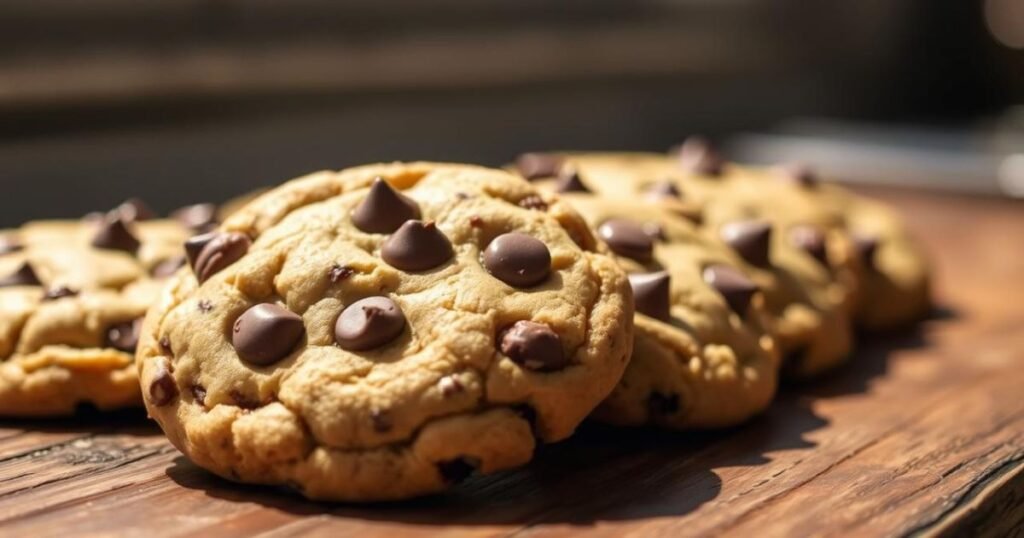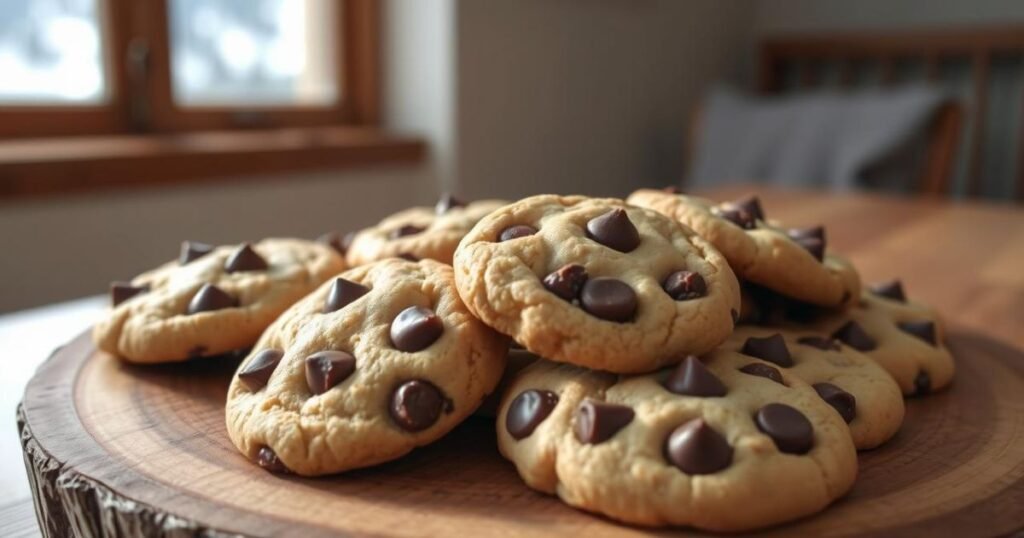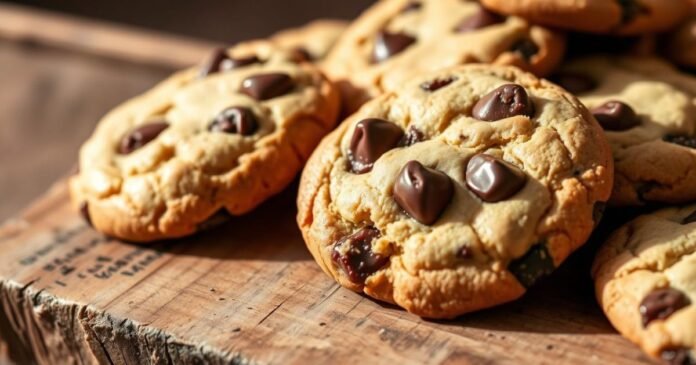Did you know baking changes at 3,500 feet above sea level? This fact shows the special challenges of baking at high elevations. As a passionate baker, I’ve found the secret to making delicious high altitude chocolate chip cookies. They stay perfect in thin air desserts.
My recipe works at 5,280 feet elevation, making 24 tasty cookies per batch. Each cookie has 224 calories, with 29g carbs, 3g protein, and 11g fat. The key is the right mix of ingredients and special baking techniques for high altitudes.
This guide will teach you the science and art of baking at high elevations. You’ll learn how to adjust oven temperatures and dough consistency. Get ready to improve your cookie-making skills with these high altitude chocolate chip cookies. They’ll make your taste buds fly!
Understanding High Altitude Baking Challenges
Baking mountain cookies at high altitudes can be tricky. Elevation changes how your cookies turn out. At heights over 3,000 feet, the air pressure drops, affecting baking.
How Elevation Affects Cookie Texture
At high altitudes, liquids evaporate faster and gases expand more. This can make your cookies spread too much or dry out quickly. Making adjustments for the altitude is key to getting the right cookie texture.
Common Baking Problems Above 3,000 Feet
Here are some issues I’ve faced when baking at high elevations:
- Dry, crumbly texture
- Uneven rising
- Overly browned edges
Science Behind High-Elevation Baking
The science of baking at high altitudes is interesting. For every 1,000 feet above sea level, water boils 2°F lower. This changes how ingredients work together. I’ve found that reducing leavening agents by 15-25% and adding 1-3 tablespoons of liquid helps in my mountain cookie recipes.
| Altitude (feet) | Leavening Reduction | Liquid Increase |
|---|---|---|
| 3,000-5,000 | 15% | 1 tbsp |
| 5,000-7,000 | 20% | 2 tbsp |
| Above 7,000 | 25% | 3 tbsp |
Knowing these changes has helped me improve my mountain cookies. With the right adjustments, you can make delicious mile-high treats that are just as good as those baked at sea level.

Essential Ingredients for High Altitude Chocolate Chip Cookies
Making perfect rocky mountain sweets means knowing how ingredients act at high elevations. By tweaking traditional recipes, you can create delicious alpine treats that match any sea-level cookie.
Flour and Leavening Agent Adjustments
For high-altitude cookies, add 1-2 tablespoons of flour for each cup. This helps soak up moisture and stops the cookies from spreading too much. Also, cut the baking soda by 1/4 teaspoon for every full teaspoon in the original recipe. This tweak prevents the cookies from rising too fast and then falling.
Role of Brown Sugar in Cookie Structure
Brown sugar is key for chewy, tasty cookies. At high altitudes, use 1 tablespoon less brown sugar for each cup. This adjustment helps control spread and keeps the cookies with the right texture.
Choosing the Right Chocolate Chips
For alpine treats, dark chocolate chips or chunks are best. They keep their shape better and add a deep flavor that matches the cookies’ reduced sweetness. Use 2 cups of chips for a perfect chocolate-to-cookie ratio.
Impact of Room Temperature Ingredients
Using room temperature ingredients is vital for high-altitude cookies. Make sure your butter, eggs, and dairy are at room temperature before mixing. This ensures better mixing and a smoother dough, leading to consistent baking results at high altitudes.
| Ingredient | Sea Level Amount | High Altitude Adjustment |
|---|---|---|
| All-purpose flour | 2 1/2 cups | Add 1-2 tablespoons |
| Baking soda | 3/4 teaspoon | Reduce to 1/2 teaspoon |
| Brown sugar | 2 cups | Reduce to 1 3/4 cups |
| Chocolate chips | 2 cups | No change |
Step-by-Step Baking Instructions
I’m excited to share my foolproof method for baking high-altitude chocolate chip cookies. Let’s dive right in!
First, preheat your oven to 400°F. This higher temperature is key for baking at elevation. While the oven heats up, cream room temperature butter with packed dark brown sugar for about 3 minutes. This creates a lofty base for your cookies.
Next, add one large egg plus an extra yolk, mixing well after each addition. Stir in vanilla extract for flavor. In a separate bowl, combine flour, salt, and any leavening agents. Carefully fold this mixture into your wet ingredients.
Now for the star of the show – fold in 1 generous cup of lofty chocolate chips. Dark or semisweet work best at high altitudes. Use a medium cookie scoop to form 2-tablespoon dough balls.
Place 18 dough balls on each baking sheet, arranged in rows of 4/3/4/3/4. Bake for 10-12 minutes, rotating sheets halfway through. Let cool on the baking sheets before enjoying your perfect mountain-high cookies!
| Altitude | Sugar Reduction | Baking Powder Reduction | Liquid Increase |
|---|---|---|---|
| 3,000 feet | 1 tbsp (12 g) | 1/8 tsp (0.47 g) | – |
| 5,000 feet | 2 tbsp (24 g) | 1/8 to 1/4 tsp (0.47 to 0.94 g) | 2-3 tbsp per cup of flour |
| 7,000 feet | 3 tbsp (36 g) | 1/4 tsp (0.94 g) | 3-4 tbsp per cup of flour |

Tips for Perfect Mountain Cookie Results
Baking chocolate chip cookies at high altitudes can be tricky. I’ve learned some secrets to ensure your altitude chocolate chip cookie recipes turn out perfect every time. Let’s dive into the key tips for success.
Dough Consistency Secrets
For the ideal dough consistency, I always refrigerate it for at least an hour before baking. This prevents over-spreading and enhances flavor. Adding a tablespoon of cornstarch to your recipe creates a thicker, chewier cookie.
If the dough feels too soft, I mix in 1-3 tablespoons of flour. For dry, crumbly dough, 1-3 teaspoons of liquid usually does the trick.
Cookie Sheet Preparation
Proper sheet prep is key. I line my cookie sheets with parchment paper to prevent sticking and ensure even baking. For best results, I use light-colored, non-insulated baking sheets.
These promote even heat distribution, leading to perfectly baked cookies.
Storage and Freshness Guidelines
To keep your cookies fresh, store them in an airtight container right after they cool. This prevents them from drying out quickly in the dry mountain air. For longer storage, I freeze the dough in pre-portioned balls.
This way, I can bake a fresh batch whenever the craving hits.
Troubleshooting Common Issues
If your cookies spread too much, try adding 2-4 tablespoons of flour to the dough. For cookies that don’t spread enough, mix in 1-3 teaspoons of liquid. To prevent over-browning, I reduce sugar by 1-2 tablespoons and lower the oven temperature by 15-25 degrees.
Remember, baking time at high altitudes is usually shorter, so keep a close eye on your cookies.
With these tips, you’ll master high altitude baking in no time. Don’t forget to adjust your vanilla extract measurements and baking time based on your specific altitude for the best results.

Conclusion
I’ve shared my insights on mastering high altitude chocolate chip cookies. With the right adjustments, you can create perfect treats even at 5,000 feet where water boils at 203°F. Remember, high altitude baking requires less sugar and more flour to combat the effects of decreased air pressure.
Experiment with different types of chocolate, from milk chocolate to mini chocolate chips, to find your ideal cookie. For the best results, use all-purpose flour and add 2-4 tablespoons extra to your sea-level recipe. The prep time is just 15 minutes, with a 10-12 minute bake at 375°F, yielding about 36 delicious cookies.
Each cookie packs 150 calories and 2g of protein, making them a tasty treat. Once cool, store your high altitude chocolate creations in an airtight container. They’ll stay fresh for up to a week, but I bet they won’t last that long! Happy baking at any elevation!
FAQ – High-Altitude Chocolate Chip Cookies
Why do I need to adjust my chocolate chip cookie recipe for high altitude?
High altitudes have less air pressure. This makes moisture evaporate faster and leavening agents react quicker. Cookies can spread too much, become dry, or rise and fall too fast. Adjusting your recipe helps get the right texture and flavor.
How much should I increase the flour in my high-altitude chocolate chip cookie recipe?
Add 1-2 tablespoons of flour for every cup in the original recipe. This helps cookies not spread too much. But, the exact amount may change based on your elevation and other factors.
Should I decrease the amount of sugar in my high-altitude cookie recipe?
Yes, reduce sugar by 1-2 tablespoons per cup. This prevents cookies from spreading too much and improves texture. But, don’t cut down too much, as sugar is key for structure and flavor.
Do I need to adjust the baking temperature for high-altitude chocolate chip cookies?
Increase the oven temperature by 15-25°F. This helps cookies set faster and prevents spreading. But, also reduce baking time a bit to avoid overcooking.
How does high altitude affect leavening agents like baking soda?
At high altitudes, baking soda reacts faster. Reduce baking soda or baking powder by 1/8 to 1/4 teaspoon per teaspoon in the original recipe. This prevents cookies from rising too fast and then falling.

High Altitude Chocolate Chip Cookies
Ingredients
- Main Ingredients:
- 2 ½ cups all-purpose flour plus 1-2 tbsp for high-altitude adjustment
- ¾ teaspoon baking soda reduce to ½ tsp for high altitude
- 2 cups brown sugar reduce to 1 ¾ cups for high altitude
- 2 cups chocolate chips
- 1 large egg plus an extra yolk
- 1 cup butter room temperature
- 1 teaspoon vanilla extract
- Optional Additions:
- ½ teaspoon salt to enhance flavor
- 1 tablespoon cornstarch for a chewier texture
Instructions
- Preheat your oven to 400°F (higher temperature helps at altitude).
- Cream room temperature butter with packed dark brown sugar for about 3 minutes.
- Add one large egg plus an extra yolk, mixing well after each addition. Stir in vanilla extract.
- In a separate bowl, combine flour, salt, and baking soda.
- Carefully fold the dry mixture into the wet ingredients.
- Fold in 1 generous cup of chocolate chips.
- Use a medium cookie scoop to form 2-tablespoon dough balls.
- Place 18 dough balls on each baking sheet, arranged in rows of 4/3/4/3/4.
- Bake for 10-12 minutes, rotating sheets halfway through.
- Let cool on the baking sheets before serving.
Notes
- Flour and Leavening Adjustments: Add 1-2 tbsp of flour per cup, reduce baking soda by ¼ tsp per full teaspoon.
- Sugar Reduction: Reduce brown sugar by 1 tbsp per cup to control spread.
- Chocolate Choice: Dark chocolate chips work best for rich flavor and texture.
- Room Temperature Ingredients: Ensures better mixing and even baking.
- Baking Temperature: Increase to 400°F for high-altitude baking.
- Chilling the Dough: Refrigerate for at least 30 minutes (or overnight) to improve texture and prevent spreading.
- Storage: Store cookies in an airtight container with a slice of bread for moisture retention.
- Freezing Dough: Shape dough into balls and freeze; bake directly from frozen for a fresh batch anytime.

